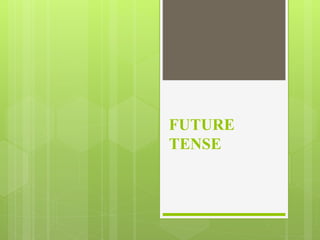FUTURE TENSE.pptx
•Transferir como PPTX, PDF•
0 gostou•48 visualizações
This is a presentation about future tenses.
Denunciar
Compartilhar
Denunciar
Compartilhar

Mais conteúdo relacionado
Semelhante a FUTURE TENSE.pptx
Semelhante a FUTURE TENSE.pptx (20)
Último
God is a creative God Gen 1:1. All that He created was “good”, could also be translated “beautiful”. God created man in His own image Gen 1:27. Maths helps us discover the beauty that God has created in His world and, in turn, create beautiful designs to serve and enrich the lives of others.
Explore beautiful and ugly buildings. Mathematics helps us create beautiful d...

Explore beautiful and ugly buildings. Mathematics helps us create beautiful d...christianmathematics
Último (20)
Fostering Friendships - Enhancing Social Bonds in the Classroom

Fostering Friendships - Enhancing Social Bonds in the Classroom
Micro-Scholarship, What it is, How can it help me.pdf

Micro-Scholarship, What it is, How can it help me.pdf
Unit-IV; Professional Sales Representative (PSR).pptx

Unit-IV; Professional Sales Representative (PSR).pptx
Kodo Millet PPT made by Ghanshyam bairwa college of Agriculture kumher bhara...

Kodo Millet PPT made by Ghanshyam bairwa college of Agriculture kumher bhara...
ICT Role in 21st Century Education & its Challenges.pptx

ICT Role in 21st Century Education & its Challenges.pptx
Food safety_Challenges food safety laboratories_.pdf

Food safety_Challenges food safety laboratories_.pdf
General Principles of Intellectual Property: Concepts of Intellectual Proper...

General Principles of Intellectual Property: Concepts of Intellectual Proper...
Vishram Singh - Textbook of Anatomy Upper Limb and Thorax.. Volume 1 (1).pdf

Vishram Singh - Textbook of Anatomy Upper Limb and Thorax.. Volume 1 (1).pdf
Explore beautiful and ugly buildings. Mathematics helps us create beautiful d...

Explore beautiful and ugly buildings. Mathematics helps us create beautiful d...
HMCS Max Bernays Pre-Deployment Brief (May 2024).pptx

HMCS Max Bernays Pre-Deployment Brief (May 2024).pptx
FUTURE TENSE.pptx
- 1. FUTURE TENSE
- 2. FUTURE TENSE Predictions/statements of fact - Intentions - Arrangements - Scheduled events
- 3. Predictions / statements of facts The auxiliary verb will is used in making predictions or simple statements of fact about the future. The sun will rise at 6.30 tomorrow. Lunch break today will be 10 minutes longer than usual. In the year 2050 all students will have their own computers in school.
- 4. Intentions The auxiliary verb going to is used in talking about intentions. (An intention is a plan for the future that you have already thought about.) We're going to buy a new car next month. I'm going to work in a bank when I leave school.
- 5. ARRANGEMENTS The present continuous tense is used in talking about arrangements. (An arrangement is is a plan for the future that you have already thought about and discussed with someone else.) I'm meeting my mother at the airport tomorrow. Our grandparents are visiting us this Christmas.
- 6. SQUEDULE EVENTS The present simple tense is usually used to refer to future events that are scheduled (and outside of our control). Hurry up! The train departs in 10 minutes. I leave Frankfurt at 5 o'clock in the morning and arrive in New York at midnight the next day.
- 8. FUTURE PERFECT The formula for the future perfect tense is pretty simple: will have + [past participle]. It doesn’t matter if the subject of your sentence is singular or plural. The formula doesn’t change.